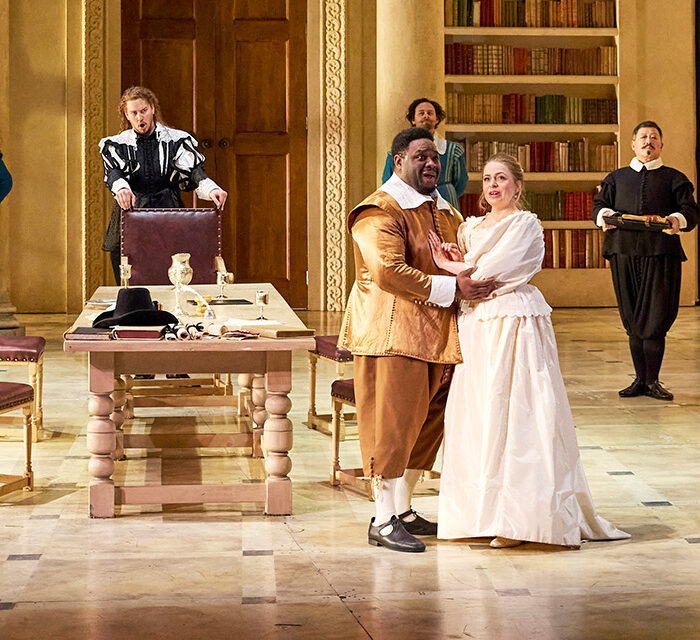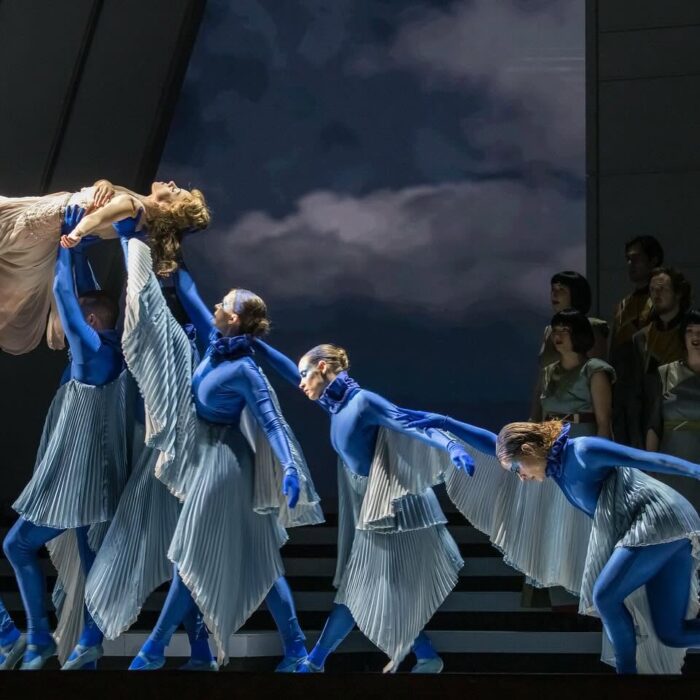
Innsbruck Early Music Festival 2019 Review: Cesti Competition
Mezzo-Soprano Grace Durham Takes Top Prize
By Alan Neilson(Photos: Celina Friedrichs)
When Alessandro De Marchi took up his post as Artistic Director of Innsbruck’s Early Music Festival one of his first innovations was to introduce the “Cesti Competition,” with the aim of promoting the profile of, and opportunities for, young singers specializing in the baroque. Now in its tenth year, the competition’s status on the international stage is now well-established and is one of the highlights of the month-long festival.
As well as the monetary awards on offer to the competition winners, there are a number of other prizes, including the chance to perform in next year’s festival Barockoper:Jung production of Melani’s “L’empio punito.” This year’s final was dominated by women, and more specifically by sopranos; of the 10 singers, seven were women, five of which were sopranos. Four sopranos carried off all the prizes, with the exception of the overall winner, Grace Durham, from the United Kingdom, who is a mezzo. It would be fair to say, however, that she was not a runaway winner; a case could easily have been made for at least four other singers, an opinion borne out by the fact she did not win any of the other prizes.
Winners & Favorites
Contestants are required to sing two arias, chosen from a prescribed list, including where possible, one from Melani’s opera.
Durham’s choices of Acrimante’s “Se d’amor la cruda sfinge,” from “L’empio punito” and “Cleofide’s “Son qual misera colomba,” from Hasse’s opera “Cleofide” proved to be intelligent selections, which played to her strengths, and allowed her to showcase the versatility of her voice, her clear articulation and florid coloratura. She also projected her voice well and displayed skill in varying dynamics to enhance characterisation. However, there was a relative lack of subtlety in her presentations; nuanced phrasing and delicate ornamentations were not her strongsuit. There was also a certain amount of unevenness of tone. Nevertheless, she carried the arias with confidence, overlaid with dramatic feeling and expressive intensity.
The audience’s favorite, however, was the Austrian soprano, Miriam Kutrowatz, who at 22 was the youngest competitor. Not only did she win the Audience Prize, but she also carried off the Nachwuchpreis, for the most promising young singer, and the Sonderpreise, which gives the winner the opportunity to perform in next year’s Barockoper:Jung presentation of “L’empio punito.” This concert performance in the Rahmen der Resonanzen in Vienna. She also obtained an engagement at the Musikfestspielen Potsdam Sanssouci as a result of this latter award.
Kutrowatz sang “Piangete occhi,” from “L’empio puniti” and Laodice’s “Torrente cresciuto” from Handel’s “Siroe.” In many ways her performance was the mirror image of Durham’s; whilst not managing to reach the emotional depths or to sing with the same degree of abandon, she was measured and precise in her delivery. Her phrasing was delicately crafted, full of subtle inflections and nuanced emphases.
Her voice has a beautiful, clear quality, which was always under control, with a seamless passaggio. Her coloratura was pleasing, although she never moved outside her comfort zone and therefore lacked the frisson to fully ignite the performance. Overall, however, it was an accomplished showcase from the young performer, from whom we are almost certain to hear more.
Other Winners & An Honorable Mention
Another 22-year-old soprano, Dioklea Hoxha, won second prize in the main competition, singing Asteria’s “Se non mi vuol amar,” from Handel’s “Tamerlano,” and Atamira’s solo, “Vaghe frondi, amiche piante,” from “L’empio punita.” She possesses a very attractive voice and an engaging stage presence. She has clear articulation, good projection and her phrasing is securely crafted. Her performance also showed that she was prepared to take risks to convey the sentiments of the arias. Although this is a characteristic to be encouraged, the results were sometimes not completely positive and a little harshness crept into the voice. Overall, however it was a very enjoyable performance, and one deserving of the second place prize.
In third place was the Cypriot soprano, Theodora Raftis. The 27-year-old’s first piece was Laodice’s “Torrente cresciuto,” from Handel’s opera “Siroe.” She produced an energetic and forceful presentation, which was full of vocal color. Although she had a wonderful coloratura and was imaginative in embellishing the vocal line, she appeared to misjudge her breath control on occasions, so that she struggled to deliver lines with the necessary consistency. It was nevertheless a wonderfully expressive performance, one in which she engaged whole-heartedly. For her second selection she sang the shortest aria of the evening, Ipomene’s “A tale affetto attendo,” from “L’empio punita.” Raftis gave a detailed and thoughtful rendition, in which the meaning of every line, every word was revealed.
One singer who was unfortunate not to figure in the list of prize winners was the Hungarian soprano, Orsolya Nyakas, whose second aria, Melissa’s, “Ah, spietato!” from Handel’s opera “Amadigi di Gaula,” was one of the highlights of the competition. In what was a wonderful delivery, Nyakas displayed interpretative maturity, technical ability and vocal beauty, and in the process captivated the audience. It was a shame that she made so little impact with her first piece, Ipomene’s “Troppo tardi” from “L’empio punito.”
It was a fascinating and entertaining competition, with a number of excellent performances. For what it is worth I struggled to decide where I should place my vote for the audience prize, but eventually opted for the Austrian soprano, Miriam Kutrowatz. However, by the next morning I had changed my mind to the Kosovan soprano, Dioklea Hoxha. I am still not sure, and I certainly do not envy the judges. Certainly, it would be easy to argue with their decision, but it would have been the case no matter whom they had chosen. Such was the quality of the singers.


